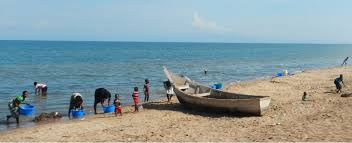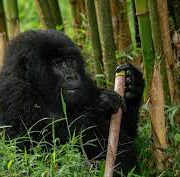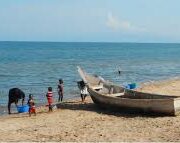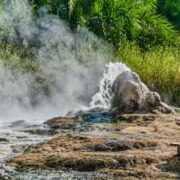
Lake Albert
Lake Albert is one of the African Great Lakes, located in the northeastern part of the Democratic Republic of the Congo (DRC) and the northwestern region of Uganda. It is a vital part of the Nile River system and plays a significant role in the region’s ecology, economy, and culture. Here’s a deeper dive into what makes Lake Albert unique:
Geography and Location
- Location: Straddles the border between Uganda (to the east) and the Democratic Republic of the Congo (DRC) (to the west).
- Area: Approximately 5,300 km² (2,050 square miles), making it the seventh-largest lake in Africa.
- Dimensions:
- Length: Around 160 km (99 miles)
- Width: About 30 km (19 miles)
- Depth: Up to 51 meters (167 feet).
- Altitude: Roughly 615 meters (2,018 feet) above sea level.
Hydrology
- Inflow:
- The Victoria Nile, which comes from Lake Kyoga in Uganda.
- The Semliki River that drains from Lake Edward.
- Outflow: The water flows out of the lake into the Albert Nile, which eventually feeds into the White Nile as it flows northward.
Lake Albert is a crucial part of the Nile River system, contributing to the flow of water that reaches countries like Sudan and Egypt.
Ecology and Biodiversity
- Fish:
- The lake is home to a wide range of fish species, including the Nile perch, tilapia, and smaller, endemic species that are vital for local fishing industries.
- Fishing is a key economic activity, with both local consumption and export playing a large role in the surrounding communities.
- Wildlife:
- Birdlife: The lake and its surrounding wetlands are rich in bird species, attracting birdwatchers.
- Hippos and crocodiles are common in the lake’s waters.
- The lake’s shores are a habitat for various aquatic plants and waterfowl, making it important for regional biodiversity.
Surrounding Attractions and National Parks
- Murchison Falls National Park:
- Located at the lake’s southern end, this park is home to the Murchison Falls, where the Nile River forces its way through a narrow gorge, creating a powerful waterfall.
- The park offers game viewing, boat safaris, and opportunities to see elephants, lions, giraffes, and more.
- Semuliki National Park:
- Located near the southern part of the lake, this park is famous for its tropical rainforest, hot springs, and unique biodiversity, including birds and primates.
- Butiaba:
- A historical lakeside town located in Uganda, which was a key area for explorers like Samuel Baker in the 19th century.
Economic and Environmental Importance
- Fishing: Lake Albert is central to the livelihoods of thousands of people who rely on its rich aquatic resources.
- Oil Exploration: The lake lies in an area of significant oil reserves, and exploration is ongoing. This has sparked debates over potential environmental impacts, as well as economic benefits for Uganda.
- The oil developments are part of Uganda’s plan to become a major oil producer, but there are concerns about oil spills, deforestation, and the effects of industrial development on the lake’s delicate ecosystem.
Tourism and Travel
- Access:
- You can reach Lake Albert by road from Fort Portal, Hoima, or Masindi.
- Visitors often go on boat trips to view the lake’s wildlife and stunning landscapes.
- Activities:
- Boat tours: Visitors can take boat rides on the lake to spot hippos, crocodiles, and a variety of bird species.
- Fishing: Anglers can enjoy sport fishing for species like Nile perch.
- Game Drives: A visit to Murchison Falls National Park for a chance to see wildlife along the lake’s southern shores.
- Best time to visit: The dry season (December to February and June to September) is ideal for easier access and wildlife viewing.
Challenges and Conservation
- Overfishing: There is growing concern about the sustainability of the fishery industry due to overfishing and illegal fishing practices. This threatens the lake’s delicate balance.
- Pollution: The rise in human population and oil exploration brings concerns about pollution and habitat degradation.
Efforts are underway in Uganda to promote sustainable fishing and environmental conservation, but challenges remain, especially with the pressures of oil exploration.
Recent Posts
All Categories
Tags
#bodabodas
#climate
#crestedcrane
#fearofflying
#gorillas
#kibalenationalpark
#lakemburonationalpark
#motorcycle
#mountainElgon
#mountains
#murchisonfallsnationalpark
#murchsionfallsnationalpark
#nationalparks
#rhinos
#Rolex
#Rwenzori moutains
#semulikinationalpark
#tourism
#tourUganda
#Uganda
#visistUganda
#visitUganda

Wildlife
Thailand





